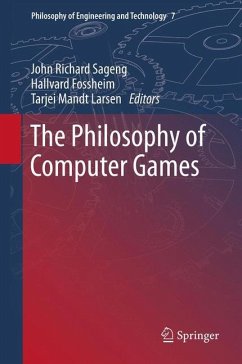Computer games have become a major cultural and economic force, and a subject of extensive academic interest. Up until now, however, computer games have received relatively little attention from philosophy. Seeking to remedy this, the present collection of newly written papers by philosophers and media researchers addresses a range of philosophical questions related to three issues of crucial
importance for understanding the phenomenon of computer games: the nature of gameplay and player experience, the moral evaluability of player and avatar actions, and the reality status of the gaming environment. By doing so, the book aims to establish the philosophy of computer games as an important strand of computer games research, and as a separate field of philosophical inquiry.
The book is required reading for anyone with an academic or professional interest in computer games, and will also be of value to readers curious about the philosophical issues raised by contemporary digital culture.
importance for understanding the phenomenon of computer games: the nature of gameplay and player experience, the moral evaluability of player and avatar actions, and the reality status of the gaming environment. By doing so, the book aims to establish the philosophy of computer games as an important strand of computer games research, and as a separate field of philosophical inquiry.
The book is required reading for anyone with an academic or professional interest in computer games, and will also be of value to readers curious about the philosophical issues raised by contemporary digital culture.
From the reviews:
"This anthology of 16 essays discusses games from a philosophical perspective. ... Game designers and those interested in philosophy ... will find the book illuminating and a springboard for new ways to think about games and interactive media. Summing Up: Recommended. Upper-division undergraduates, graduate students, researchers/faculty, and professionals/practitioners in game design." (A. Chen, Choice, Vol. 50 (6), February, 2013)
"This book is really about the philosophy of computer games. ... Previously, foundational books in computer games ... were more sociological in their orientation. This book begins to add an important pillar to that foundation. ... It asks and attempts to answer some very serious questions. ... I would recommend it first to philosophers in related fields such as the philosophy of fiction or media studies. I would also recommend it to designers of video games and virtual worlds ... ." (J. M. Artz, ACM Computing Reviews, October, 2012)
"This anthology of 16 essays discusses games from a philosophical perspective. ... Game designers and those interested in philosophy ... will find the book illuminating and a springboard for new ways to think about games and interactive media. Summing Up: Recommended. Upper-division undergraduates, graduate students, researchers/faculty, and professionals/practitioners in game design." (A. Chen, Choice, Vol. 50 (6), February, 2013)
"This book is really about the philosophy of computer games. ... Previously, foundational books in computer games ... were more sociological in their orientation. This book begins to add an important pillar to that foundation. ... It asks and attempts to answer some very serious questions. ... I would recommend it first to philosophers in related fields such as the philosophy of fiction or media studies. I would also recommend it to designers of video games and virtual worlds ... ." (J. M. Artz, ACM Computing Reviews, October, 2012)








